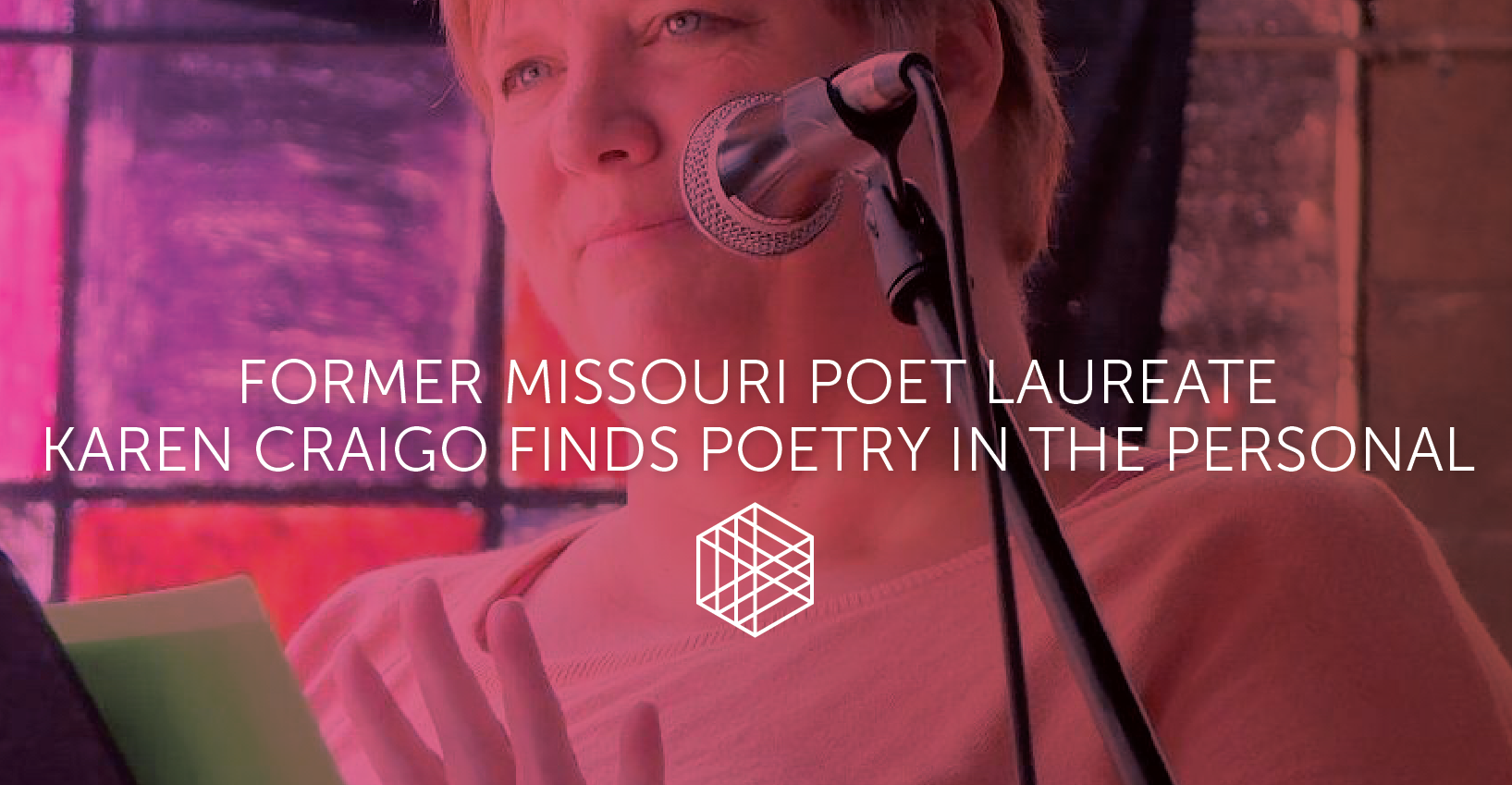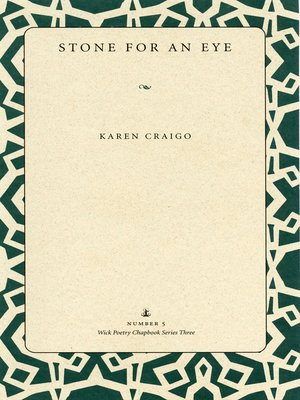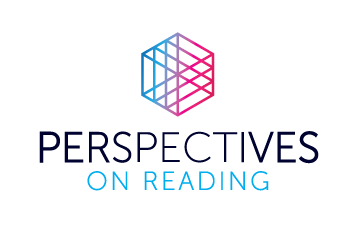Former Missouri Poet Laureate Karen Craigo finds poetry in the personal

By Jill Grunenwald, Staff Writer | July 2021
From 2000-2004, I attended Bowling Green State University, where I received my Bachelor of Fine Arts in creative writing. During that time, I also interned for the literary journal Mid-American Review, which is when I first met poet Karen Craigo. For the past two years, Karen — author of the full-length poetry collections Passing Through Humansville and No More Milk, as well as the mini-collections Escaped Housewife Tries Hard to Blend In, Stone For an Eye and Someone Could Build Something Here — has served as Missouri’s poet laureate.
With her term ending June 30, 2021, Karen sat down with me and Perspectives on Reading to reflect on her time as poet laureate.
PoR: First, a question I’m sure many of our readers are interested in, as well as myself: What exactly is a poet laureate?
Karen Craigo: It’s a funny thing. Think of the Greeks with their laurel leaf crowns, offered to those who had reached the pinnacle of achievement in their field — the laureates. I’m hardly in the pinnacle of my field in Missouri—some of my favorite poets live here, and most have more than two books and three chapbooks, like me. What it really means is that I nominated myself for the position so that I could promote poetry throughout the state. It’s a working position more than it is an honorific title, and I am always happy to work for poetry. Poetry has the power to cultivate contemplation and peace and change our lives for the better. I’m all in for spreading that message, through readings, workshops, occasional poems and just sharing my enthusiasm for verse.
PoR: Can you tell me a little bit about your background? Education, writing, all of the awesome things you did prior to becoming Missouri’s poet laureate.
Karen Craigo: I started out as a journalist before going into teaching writing at the college level — and lately I’ve been a journalist again, first as editor of a small Missouri weekly newspaper and now as a freelance editor and writer. My story is not so captivating: I was born in the Appalachian part of Ohio (a fact possibly lost on the Missouri governor who appointed me to my post), and I’ve lived in Missouri for eight years. I got my undergrad degree at Morehead State University, my Master of Fine Arts at Bowling Green State University and I’ve really been bouncing around doing this and that since I came to the Show-Me State. Being poet laureate has been a fun part of that journey.
PoR: How did you first start writing poetry?
Karen Craigo: I’ve always enjoyed playing with words and stories and sounds. I think it might date back to that very first childish experimentation with language. I grew up on Dr. Seuss, and that playful approach to language made a big impression on me. You wouldn’t call anything I wrote “poetry” until the second day of my first poetry workshop in college. The first day, I turned in a truly godawful poem about rainbows, and my soon-to-be mentor, the late Michelle Boisseau, read it and very quickly had me giggling about how over-the-top it was. I turned in something much better for my second class, and I’ve been trying to top myself with every attempt since.
PoR: You are Missouri’s fifth poet laureate, so it’s still a relatively new program. For you, what are your feelings about being able to represent the state in this way?
Karen Craigo: I’m also Missouri’s COVID-19 poet laureate, so can I be honest with you? It’s been a bit of a bummer. The coronavirus forced me to perform most of my role online, and I missed so much of the warmth and fun of in-person visits to schools and other places around the state. I have a whole untouched travel budget, in fact! I really loved Zooming with readers and writers, though, and I’ve used my time to quietly put together an anthology of Missouri poets, so I’ve accomplished a lot. It’s tough to leave the position, though, since I didn’t really get a full taste of it.
PoR: Did you have any particular goals you wanted to achieve as poet laureate? What are some of the programs and initiatives you are particularly proud of?
Karen Craigo: The anthology became my main focus, and I think people are going to love it when it comes out later this year, after my term ends. I am also very proud of a special poem I wrote for Missouri’s Bicentennial this year. That’s going to be unveiled soon on the Missouri Arts Council website, along with my goodbye message. I was also thrilled to represent Missouri with a poem that was printed in The New York Times about Thanksgiving in Missouri. I’ll bet none of my poems have been seen by as many people as that one, so you can imagine how exciting that was.
PoR: What is your writing process like?
Karen Craigo: If you ask me my preference for how I write, I’ll tell you that I like to work in the mornings with a long legal pad and a particular blue pen. I write poems in one long sitting, typically, and I revise on my computer so I can see how things would line up on the printed page. But my process has always been to destabilize myself and not to be too dependent upon factors like that. If I start to think I can write only in the morning, I give myself the challenge of writing before bed or in the afternoon at a coffee shop. I replace the legal pad with a notebook, a scratch pad, the back of an envelope; I replace the pen with a pencil or keyboard. The thing is, writing time is a little limited for most of us who try to make art while also working and being a parent. I can’t be a princess about it. I’m always sort of in training to use my time as it becomes available with whatever tools are at hand.
PoR: How would you describe the style and voice of your writing?
Karen Craigo: My work is rooted in the personal, and my voice is organic and accessible. A line may require some thought, but I don’t think I’m writing anything that would be hard to understand from a content perspective. The journalist in me takes over and explains when I do approach a complicated or generally unfamiliar topic, and I make sure it’s comprehensible. I am obsessed with the spirit — with meditation, with universal mind, with the deep self — and I often write from a very intimate space in that regard. I’m sure it’s not everybody’s cup of tea, but it’s what compels me. I’m also pretty funny at times. I think I’ve discovered that I write funny things when I’m sad and sad things when I’m deliriously happy.
PoR: You and I have known each other for a long time, and while I don’t think I took any poetry classes with you at Bowling Green State University, I still have my signed copy of your mini-collection Stone For an Eye. So, I don’t have any firsthand knowledge of you as an instructor and I’m curious about your philosophy on teaching poetry.

Karen Craigo: Part of my teaching philosophy is that any literate person can write poetry if they try – and non-literate people can make poetry, too, even if not on the page. It’s just a matter of allowing ideas to collide and reinforce or reinvent each other. Isn’t that what a metaphor is? When you say THIS is actually THAT – a completely unlike thing – and you argue for why that is, you’ve really made a poem. You’ve forced people to see the world in a slightly askew way. I start with imagery, like simile and metaphor, and focus on making discoveries through contrast. I like to keep things lively and fun and especially surprising, because surprise is where the poetry happens.
Oh, and I know that not everybody takes a 200-level English class because they’re dying to be a poet. I try to get some converts to the poetry audience from my students, even if they don’t intend to write again. Poetry is just so good for the heart.
PoR: What is happening in the poetry world these days that really excites you?
Karen Craigo: What I love about poetry these days is also what I love about fashion and music and so much more, and that’s the “anything goes” quality of the art form. People are doing all kinds of things now, and there aren’t any gatekeepers that we’ve empaneled to decide who’s in and who’s out. I think this is probably different than things were in the past. There were always beautiful rule-breakers, but I think there were rules. There aren’t any now. You can be a formalist, a language poet, an erasure poet, a found poet, a lyric poet, a narrative poet, a concrete poet, and it’s all allowed to exist in the same tent. People still have a weird animus against centered poetry, for some reason, but otherwise, it feels like anything goes.
Something I’ve been excited about in a personal way is the idea of poetry as a pathway to the spirit. Poetry has always been very spiritual to me. It’s my meditation and my prayer, and when I’m engaged with it, sometimes I really do believe that I tap into something gigantic and gorgeous and universal. That’s my portion of the “anything” in “anything goes.” I love so many poems and poets who want nothing to do with the spiritual stuff that attracts me to the page, and I benefit from their beauty and meaning-making. A poem can be purely concerned with the twin pillars of rhetoric and sound, and when it hits with me, I can have an ecstatic experience, even if the poem is rooted in pure intellect. And let’s be honest, if I’m just noodling and praying and goofing on the page and I don’t involve any intellect or attention to sound, what a waste of a reader’s time that is. I’m not promoting writing as healing, though I love the possibilities of that practice, and I know the good that can come from journaling. But I intend to make art, and I remain exacting about craft, though open to revelation and awe.
PoR: For anyone interested in writing poetry, particularly young writers, what advice do you have for them?
Karen Craigo: I’d like to see people give up the stories they tell themselves about their art and see them just make art. Making time for poetry is the key to overcoming writer’s block or any other problem that crops up. If you think you want to be a poet, write a poem. If it’s crap, either fix it or scrap it and start again. Keep the pen moving (or the fingers moving on the keyboard, if that is your preference). Get something down. You can fix something that exists on a page. You can’t fix nothing.
PoR: Your husband is a fiction writer and together you have two sons. I imagine there must be a lot of creative energy in your house on a regular basis.
Karen Craigo: My kids are both sages. They say the most intriguing things, and they inspire me all the time. Heck, some of my poems can be directly traced back to Facebook posts where I quote their quirky remarks. I don’t know what I’ll do when they’re out of the house! Guess I’ll have to go back to making things up…
My husband, Michael Czyzniejewski, is a brilliant fiction writer — moving and hilarious! I don’t know why they don’t have a fiction laureate. He’d be my choice. He’s certainly the laureate of my heart.
[Ed. note: Michael Czyzniejewski is the author of the short story collections I Will Love You For the Rest of My Life: Breakup Stories, Elephants in Our Living Room and Chicago Stories. And his stories are, indeed, moving and hilarious.]
PoR: What do you hope your legacy as Missouri’s poet laureate will be?
Karen Craigo: I can’t even wrap my mind around the idea of a legacy. My term ends June 30, and if we can make it just a few more days without Missouri mysteriously burning down under my poetic watch, I’ll chalk it up as a win. All I know is that it has been a remarkable journey, even during a difficult time, and I’m so grateful to the Missouri Arts Council, the Office of the Governor and the citizens of the Show-Me State for the rewarding experience. I’ll cherish it forever.
Oh, and I bought myself a gold crown that I wear when I’m feeling frisky. Does that count as a legacy?
This interview has been condensed for length and lightly edited for clarity.


